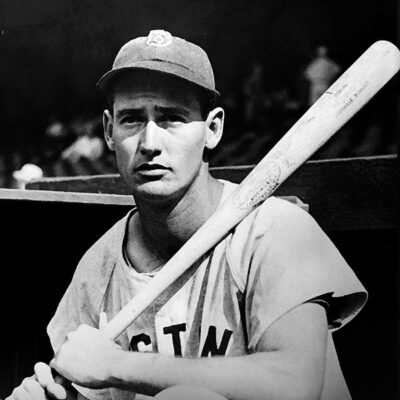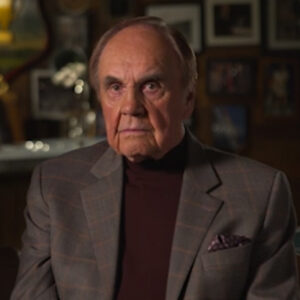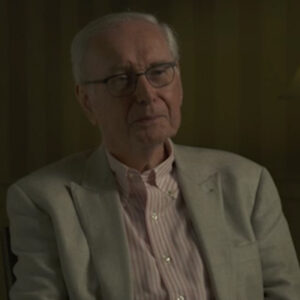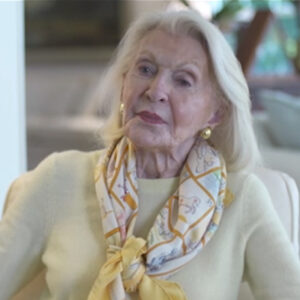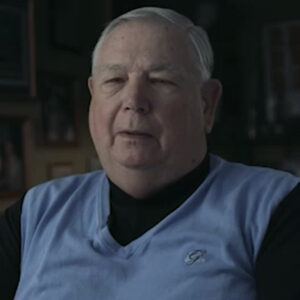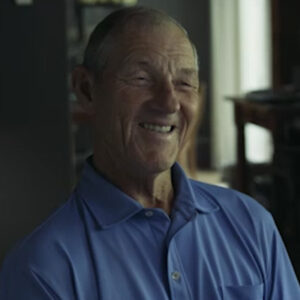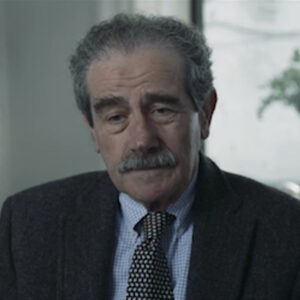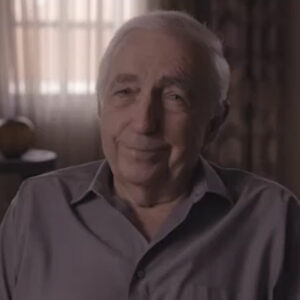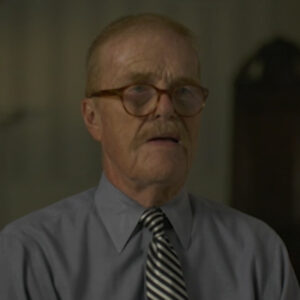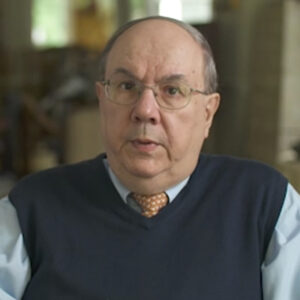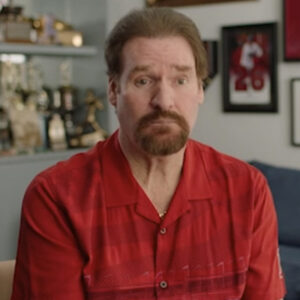Speaker 1 My name is strapped in, I’m probably best known for the early years of the 1950s of taming big tapin with a fly rod and the shallow flats of the Florida Keys. Good enough, we good.
Speaker 2 All right, Stu, tell us the story of how you met. Oh, I should say not with the exception of this question, because this question I want you to begin with, I was a student at the University of Miami, you know, but for the most part, it would be great if you could, because my voice will never be heard. So it’d be great if you could just incorporate the question into your answer so we won’t do it here but from here on out. So just please tell me the story of how you met Ted Williams.
Speaker 1 In 1948, I was a freshman at the University of Miami in premed school, I was a chemistry major, zoology minor, and one of the courses I had to take in zoology was botany. I hated to learn the
Speaker 2 I’m going to interrupt you because a truck backing up, it’s probably just a truck. No, I think that’s a truck backing up. It’s just as luck would have it right now, I don’t hear it. Yeah, I just, you know, when they back.
Speaker 1 I know, but I don’t hear it. Yeah. Oh, the beep beep. My hearing aids are not that great I guess.
Speaker 2 Usually, I think microphones just pick. I take my cues from Joel because Joel kind of look over like so we good. Yeah, they don’t back me up seems. Let’s let’s take it from the top. OK.
Speaker 1 In nineteen forty eight, you want me to introduce myself again?
Speaker 2 No, no, no, just in 1940 was great. Yeah. Let you get that, yeah.
Speaker 1 My phone would ring all day.
Speaker 2 Oh, no, I
Speaker 1 know, but I’ve got. The trying to get done all kinds of things from hurricane. Let me know when you are funny.
Speaker 2 OK, thank you, very good speaker.
Speaker 1 In nineteen forty eight, I was a freshman at the University of Miami. In premed school, I was a chemistry major, zoology minor, and one of the courses I had to take in zoology was botany. And I hated I seriously hated to have to learn the Latin names of plants and flowers. And so I skipped the botany lab one day. I decided to go fishing at the Tamiami Trail in the Baako Canal for Schnuck. I had some great fishing on a Marco canal, and then after leaving there at about 10 o’clock in the morning, the fishing was over. I’m driving down. I have a 1941 DeSoto and I have my fly rod sticking out the back window on the driver’s side. I am driving down the Tamiami U.S. 41 road and I see a big dude standing on the side of the highway casting a fly and he looks like he’s doing a good job. So I go past him, pull over on the side and then get out of the car, watch him for a little bit out of my side view mirror, get out of the car and very carefully walk back in around him so I don’t disturb him and watch him for a bit while he’s doing a great job of throwing a fly to the far side of the canal by our side of the bank. And after a while I say, Excuse me, sir. Are you having any luck? He didn’t acknowledge did you hear me? And I say it again louder. Excuse me. Are you having any luck? Still no response. I thought, well, maybe this guy’s hearing impaired and I really say it louder. See, now, are you catching any snug? Well, that snook was the was the word that lit him up. And he said, turn to me slightly. And he said, hey, what do you know about Bush? I said, well, I know enough that I’ve got three of them this morning that were over 15 pounds outfly. And he happened to look at my car. So the fly rod sticking out the window. Now he wins in and walks right over to me and he says, Where are you telling me the truth? Where’d you get those? I said, Well, in the Markoe canal. He said, Where in the Markoe canal? I said, Well, you know, I could try and tell you where, but it was a certain turn and I’d have to. I’m going to be there again tomorrow morning at daybreak. And you’re welcome to come along. And he said, where are you staying? She said, I’m staying in Wevers camp up the road here. So where are you staying? I said, I’m sleeping in the backseat of my 41 DeSoto and I’ll be parked over at Royal Palm Hammock at the entrance to the Marco Road. He said, well, what time do you do that? I said, well, if you could be there at six o’clock, it’ll be just right. Next morning, I’m sleeping in the back seat of my 41 DeSoto, and I’ve got mosquito netting up because I have the windows slightly open, I reach over.
Speaker 2 Scratch.
Speaker 1 I’ve got mosquito netting up and I have the windows slightly open and I’m fast asleep at five thirty in the morning and I hear a knock on my window and I reach down, pick up a 22 revolver I had there in my flashlight and I shined a flashlight. I didn’t know who that was shining a flashlight up there. And this guy is at my window, same guy that I spoke to that was fishing the Tamiami Canal the day before. And I said, What time is it? He said, it’s five thirty Bush. I said, I thought I told you to be here at 6:00. We don’t have to be there yet. Well, he’s drinking a cup of coffee and a go cup would have been nice if he brought me one, but he didn’t I hadn’t had any coffee in days. Anyway, uh, we get together and he follows me in his station wagon down to the Marco Canal. We get out and get set up, takes a while and we haven’t even introduced ourselves. So he didn’t know my name. I didn’t know his would have made any difference. Uh, I put him in the prime place where I knew the snow could be coming just after daylight.
Speaker 2 All right. I’ll pick it up there. When?
Speaker 1 I put this gentleman in the prime spot where I knew the fish would be coming first, I wanted to make sure that he caught some. He looked like he was a good caster in a pretty nice guy, but we had hardly talked. He did catch a couple of nights, snuck over 15 pounds and I caught two, he caught three, caught one more than I did. And now the fishing was over, the bite was over. The fish quit coming. So it was time for me to get back to Miami. And for the first time, we really introduce each other myself. You know, his name was Ted. And I was doing that’s all I knew. He wrote out his phone number and his name on a piece of paper and gave it to me. And he asked me mine. I gave him my name, which he wrote down in a phone number that I could be at my house, and that was it. Well, headed back to Miami in about, oh, I would say three weeks later. I come home from the university, I was living at home and my mother said some guy by the name of Ted Williams has called four times today, and about the fourth time, he was starting to sound a little irate that you weren’t returning his call. I said, Mom, I don’t remember. I don’t know anybody by that name, and she said, well, he said he fished with you on the Marco Canal. I said, Oh, that big dude. And that was it, you know? So I got his phone number. I called him back. The phone rang over there. He was living his off season. Place to live was a house in Coral Gables and a gal answered the phone. I guess it was a maid there and said Williams residence. And I said, Is Ted there? She said, Well, I don’t know who’s calling. And I told her and I said that I had fish with Ted and he gave me this number one me to call returned his call. So she said, well, hold the wire. And I did. I held for too long. I was about to hang up because he hadn’t come back to the phone. It was clear. And then finally he came to the phone and he apologized. He said, Sorry, Stu, I was tying some bonefish lies. I was right in the middle of one and I couldn’t stop. I said, no problem. He said, What are you doing tomorrow? Bush, who’s calling me Bush? I didn’t know what that meant. It later I found out meant Bush league, not the big league like Ted was. Anyway, Tiger flies and he said, What are you doing tomorrow, Bush? I said, Well, nothing that I know of. Why? He said, Well, I’m going bone fishing in Biscayne Bay over to. So I’m going bone fishing in Biscayne Bay. I keep a boat over in Coral Gables there right on the water, said it’s a skiff. We’ll go from there over to Soldier Key and we’ll have a good tomorrow morning. There’ll be a great dead low incoming tide for the Bonefish. Are you up for it? I said, sure, I’d like to do that. Anyway, we hung up.
Speaker 2 Yeah, but. We’ll just have to pick it up anyway. Yeah, yeah, we got a.
Speaker 1 Anyway, when we hung up, I went off doing something else. My phone rings and a friend of mine, Bill Lewis, who I went to school with high school and college, and he was a great fishing friend of mine. His mother actually was the secretary at the Rod Real Club and made a lot of interest for me. But Bill said, what are you doing tomorrow? You want to go back out to the Tamiami Trail? I said, well, I just made arrangements to go bowling, fishing tomorrow. Just bone fishing with who I said was some guy by the name of Ted Williams. And he got here a great big gasp. And he says, Ted Williams. You mean the Ted Williams? I said, the only Ted Williams I ever knew. And he said, tell me about them. And I did. And he said, You don’t know who he is. I said, no, I had no idea. Well, then he clearly clued me in about Ted. And Ted had said on the phone, he said, I said, you know, should I bring some lunch? He said, no, I’ll take care of all that. He said, but just don’t be late. And I said, I’m never late. Anyway, it went on from there, we got in his boat the next morning at eight o’clock. Ran across Biscayne Bay. There was a dead low tide and he knew his way and we had to know your way, got out of the boat, anchored the boat, got out and we were waiting in. The Bonefish were starting to come in and tailing, it was awesome. We had a great morning. I don’t remember actually how many we caught, but it was a lot back that time. I had already joined the Century Club, which was a club where you had to have cats. You had to have caught more than one hundred Bonefish. I’ll fly out of a boat while waiting to join the Century Club. Anyway, Ted Outfest me that morning pretty badly because he could really cast and he knew what he was doing better than I did. And it was a great morning of bone fishing and we got to know each other a little bit and we went on from there.
Speaker 2 Question for you. What was that? Was it like an email or something coming in? It sounded like it was coming from the office. OK, all right, but it was it was when it was when Stu was talking on the phone with his friend. Right? Did it did you hear it? I didn’t really hear. Oh, you didn’t hear? Yeah, I, I, I kind of heard it, but I didn’t it wasn’t disruptive. And what he was saying at all, I didn’t hear. OK, ok, ok. So let’s do this. That’s great. That’s great. Let’s do this. Tell me. So we’ve got the long version. Tell me let’s see if we can get a forty five second version of that story, so let’s see if we can just do you we’re going to skip school years from Miami. You went out on the Tamiami Trail. You saw this big dude. You had the conversation, you had. You ended up fishing the next day together, and then eventually you found out it was Ted Williams, so maybe we could just do it just a slightly just like a shorter version. So they have some choices in terms of what they want to do.
Speaker 1 Well, you could probably edit that version.
Speaker 2 You can. You can. But if you can if you’re up for it, I mean, if you’re up to just do that, you can just do that. A shorter version
Speaker 1 or I can try.
Speaker 2 All right. Good enough. Good enough. Good. Still speak any time you’re ready.
Speaker 1 In nineteen forty eight. I was a freshman at the University of Miami and pre med school taking. In 1948, I was a freshman at the University of Miami and premed, I was taking my my major was chemistry, my minor was zoology. Part of that I had to take a course in botany, which I hated. So I would cut my labs and go out to fishing at various places. This particular that’s going to be difficult because I thought,
Speaker 2 well, let’s say. Let’s say. How many if you just said one day I skipped school at the assembly, I skipped my class that year, Miami, and I’m driving down and then we just get into it, they’re. Maybe that will help you if you can, if you could do it.
Speaker 1 Uh. I will let them edit that we go on to another part, OK?
Speaker 2 All right, good enough. Um. So tell me,
Speaker 1 I think there’s enough there for editing.
Speaker 2 You know, sometimes, I mean, we can come back to it, too, at the end if you want, and maybe try to do a little bit of it. But no, you told the story great. It’s just that they always prefer to have a shorter version. I no longer version. You know how it is.
Speaker 1 Yeah, they can do it on this.
Speaker 2 Let me ask you this. What were your and you’ve talked about this a little bit, but maybe go into it a little bit more. What were your initial impressions of Ted? What kind of a guy did he seem to be when you first met him?
Speaker 1 When I first met Ted that morning. He was very intent on what he was doing was obvious to me that he was good about what he was doing, his fly fishing, but he was a very intense individual and wanted to get it done right, wanted to get it done now. And he never changed.
Speaker 2 We get some little oil, something from the paper. Yeah, it just Janine from this. No, no, I don’t think Janine in the bedroom. That’s all right. We just have to do it again. Do you think she’s Janine didn’t have options? I’m sorry, are you are you finished?
Speaker 1 OK, thank you. You know, we’re picking that up, baby.
Speaker 2 Yeah, exactly. Yeah, I know these mikes are bad. These mikes are bad.
Speaker 1 If if you have to, you can go across the street to our daughter.
Speaker 2 So tell me to just that was great. So just take it from the top and tell me what your initial impressions of 10 were.
Speaker 1 It was easy to see, easy for me to see that Ted Williams was a very intent person on anything he did. Turns out that he was actually a student and anything he did, any sport, anything really, whether it be tying a fly, he wanted to be the best or rigging bait for deep sea fishing. I mean, he was great and he wanted to be great. And he was.
Speaker 2 Wendy, Ted, so tell me, when Ted moved to Ireland Morada. He had been here throughout, he would come here every year, obviously, but at some point, so tell me that and then tell me that, you know, at a certain point he moves here and he makes this his whole.
Speaker 1 Ted had a small house in Almereyda on the ocean side, Hurricane Dahla brought the waves right over it, unfortunately, and one of the things Ted had in his garage was a special made Nova Scotia hole. It was the first of the molded plywood boat and it was awesome. And he had a 40 horsepower Johnson motor on it. Hurricane Donna scuffed it up some Ted actually got the insurance for the destroying of that boat and gave it to me boat, motor and trailer, and it only had a few scuff marks. It was I didn’t even have to repaint. It was really a great boat. I was guiding in the lower Florida Keys at that time, and Ted used to come down and spend a lot of time with me.
Speaker 2 How tell me how long Ted lived in Iowa Morada. And tell me why you think Eila Mirada was so appealing to him.
Speaker 1 How long he lived? I’m not sure.
Speaker 2 Well, he moved in like the late 90s, right?
Speaker 1 No, no. In the 50s.
Speaker 2 No, no. I’m saying he moved away, I think.
Speaker 1 Oh, OK. Yeah. Up, up, up. Upstate, right.
Speaker 2 Probably lived here. I mean, we could say about four years. I think that’s about fair. Right?
Speaker 1 At least 40 years.
Speaker 2 So should you say that? So tell me that. Tell me that Ted lived in the Morada for at
Speaker 1 least 40 years
Speaker 2 and then tell me why you think it was so attractive. It was such an attractive place for him.
Speaker 1 I think Ted lived inamorata for at least 40 years. He liked the people there, he loved the guides because he Ted was a student. He learned from these guides and became better than they were in most cases. So he did it always. He was there when the fishing was good and he was there when the fishing was bad.
Speaker 2 Do you think that it also had to do because a lot of people knew that he was very private person and and a lot of people thought that, well, back then, you know, this island was very sparsely populated. The idea of Williams being down here was like the frontier. And people thought that he liked that. He liked the fact that, you know. You know.
Speaker 1 Ted and I used to make bets on everything, whether it be a football game, baseball game, a fight, a boxing match, no matter what. Every time he lost the bet, he would write on a one dollar bill. I lost this bet to Stu because and right what it was and signed his name and date it. And these were all so far so long ago. These were all silver certificates. I have them all. And the ink is fading pretty badly, but I think I can get them re brought up. I have a whole stack of them. We made one bet though that he wanted to do one hundred dollars and we did. And we were doing a thing for children, for youngsters at the. Park inamorata, that de. Jimmy Allbright, who did fish with a bunch and on camera and all in Ted came to me and Ted wanted to know about a particular fly line that I was using. It was a Manacor mano a mano fly line that Shakespeare was making. And Ted said, oh, that doesn’t have any corners. Yes, it does. It has a monofilament core. And he said, no, I know better than that. It does not. And I said, Ted, I’ll go home, which was around the corner. And you bring one of them that back to you and show you. So he said, well, I’ll bet you a hundred dollars it doesn’t have a car. And I said, save your money. I know it does. I’ve been into it. And he said, No, no, no, you chicken. I’ll bet you. So I said, OK. And we shook hands. And he called Jimmy Allbright. We said, Jimmy, I’ve just made this bet with Stu for one hundred dollars. I want you to witness it. And we told him what it was. I went home, brought back that a brand new one in the box, monarch or butterfly fly line. And I took some monofilament and pulled the finish off of it. And sure, it had a monofilament core inside in Ted’s face dropped and he said, oh, OK, OK. I owe you a hundred. Well. He wasn’t so quick coming up with that hundred. This is back back in the nineteen sixties, maybe early 70s, and one day my now ex-wife said that she was at Ace Hardware in Almereyda and Ted was walking out and saw her and called her over and said, here, would you give this to do for me, gave her a hundred dollar bill. And she said, Oh this just do it. Next time I saw Ted I said, Ted, you chicken, blank, blank, blank. You didn’t have guts enough to give it to me yourself. You didn’t. And I said, you know, that’s just the way life is. Well, we had lots of on and off things like that. There were times when we were in a boat together. If somebody was in another boat nearby could hear us, they’d think we hated each other, cussing each other and telling each other how bad we were and so on. But we were really, really great buddies for around 50 years of fishing together.
Speaker 2 It’s right, um. Up, let’s pick up with that. Because I think I think a lot of people have this image of Ted as being sort of short tempered and not kind of suffering fools or small talk. Was that true? And was there another side to him as well?
Speaker 1 You know, some people think Ted was hard to get along with. But it wasn’t the case, there were times when his blood sugar was low, that he was a bear, really a bear. He when he was latter years of playing ball, still playing, he would eat a grapefruit for breakfast, take a grapefruit out in the boat with him and have a grapefruit for lunch. But his blood sugar would go to pot and he would be difficult to be with. After dinner late in the evening, he would garbage down food with both hands, I mean, he could eat faster than anybody I’ve ever seen. It would be bite, swallow by eat, didn’t you? And but it didn’t take very long before his blood sugar would get up and he would be smiles. And in Charming, my mother thought he was the most charming person she ever knew. I mean, he really charmed her. Ted was sometimes up and sometimes down.
Speaker 2 But Stu, is the paper just yes, just like with the nails and just yeah, actually, actually, if you don’t mind, if we could just put it on the floor.
Speaker 1 I can’t read it then.
Speaker 2 No, I know. I know. But well, if you just try to keep your hands.
Speaker 1 Yeah, I will.
Speaker 2 Because the ruffling in the. So let’s if you could. That was great. Let’s let’s tell me that again. And I think you just started with a lot of people thought it was hard to get along with and we’ll just do that again. Well, that’s OK, I.
Speaker 1 A lot of people thought Ted was hard to get along with. I found him great to be with. We did a lot of things together and a lot of places. We finished in a bunch of places together. But I did find out that when Ted’s blood sugar was low because he was watching his weight and he wouldn’t eat properly. He was a bear to be around, but after he had something good to eat in the blood sugar came up, man, he was smiles and cordial. Just great to be with. That was Ted.
Speaker 2 Tell me the part about your mom thinking he was.
Speaker 1 That was Ted and my mother thought he was the most charming person she had ever met. Metellus, Yeah. When Richard Nixon was running for president. You know, maybe before that, maybe we ought to go into Ted now flying. Because that’s part of it.
Speaker 2 Well, we’ll get to that, but if you want to, the Nixon story, to the Nixon story.
Speaker 1 Well, OK. When Richard Nixon was running for president. Ted was a Nixon fan and Nixon was a TED fan, and they were having an American Legion convention at the Miami Airport on the far side of the airport, and they wanted Ted to be there, to be on camera with Nixon. Well. Ted and I are both out of the naval aviators work, and Ted would not fly airplanes anymore. He asked me if I would fly him up there, I had a hour try Pasir that we kept on several linky while I brought it to the little strip in Almereyda and we flew up to the Miami airport. I was on camera on this big stage they had built out there with Ted Williams and Richard Nixon and the evening six o’clock news. I didn’t know. After I got home that evening, my mother called me in the I was living in the keys and said, why didn’t you tell me? I had all these friends of mine calling saying that you were your son was on the evening news with with Richard Nixon and Ted Williams. And why didn’t you let me know? I said, Mom, I really didn’t know. It just happened that way.
Speaker 2 So the flying so let’s talk about this, what do you think? So the thing about Williams is, I mean, everybody knows what a great hero you was. Some people know that he was a pilot and it was a very good pilot. Some people know he was a fisherman. He was a very good fisherman, but. What do you think it was about him that made him want to be the best hitter, be the best pilot, be the best fisherman, what drove him?
Speaker 1 Let me tell you something about Ted. Believe it or not. Ted and I both had inferiority complexes, true story, you know, uh, people don’t believe that about me. They didn’t believe it about Ted. But I guarantee you for sure, Ted and I actually talked about it at times, and that drove him to be better than anybody else because he was always proving it, as I was to himself. Why and how is always better. He was a student of everything he did, I don’t care if it is a sport, tennis, golf, funny golf story. Ted always wanted me to play golf. I had never had a golf club on my hands, but one of my clients as a guide was a professional golfer, and I got him to write up a par two card for me. And I kept telling Ted, Yeah, look at my Cartera. You know, I have a handicap of two. You know, it wouldn’t be fair for me to play with you. Well, I mean, that was a funny thing, Ted believed it, and one day I finally told them that that was just a bogus card. I thought he was going to hit me.
Speaker 2 Tell me. Tell me how accomplished and who better than you? Tell me how accomplished a fisherman Ted was both in the early days and then and then later, in your estimation?
Speaker 1 I have been asked many times, you know, who do I think was in the top 10 angler’s of the world, I always put Ted Williams in that top 10 because he was not only a good fly fisherman, spin fisherman, bait casting, saltwater, freshwater. He was a student of all kinds of fishing. He was a great overall angler. He could make the debates, whether it be flies or lures. I still have I still have a bunch of lures, tarpon lures that Ted Williams made and gave me. I have them in there. They would still work. I promise you. Ted was a student and he was good.
Speaker 2 That’s great, um, tell me what some of his favorite fishing spots around Albarado were. You can tell he would go.
Speaker 1 When I would see Ted out fishing, I knew it was a good place because he would not go back to a place that wasn’t good at that time with the tide. Now, there’s a place off a long key that I knew in April and May. In June, I would find Ted doing the outgoing tide for tapin he’d be there. He’d have both a fly rod and a spinning rod. He and like me, I use fly plug and spin. People think all I do is fly fish. People thought all Ted did was fish and he did all kinds. We do, and that’s the way it was. But I knew where wherever Ted was, wherever I’d see him, it was a place to be. Can I look at my notes?
Speaker 2 Of course,
Speaker 1 I think I have some things that would be
Speaker 2 of interest. I was going to I’m going to cut just cut your. Cutting. It sounds peening is to take to. You know, tell me a little bit about about the camaraderie he had, you said with the guides, you really like he like the guides and a lot of people would say, well, it was a little bit like, you know. When you when you’re on a baseball team, you’re always around the guys, you know. Was that you think you think it was a similar kind of attraction for him that he just liked being around. Tell me about his relationship with the fishing guys in Liberata.
Speaker 1 Ted did not have time for people that were not good at what they do. He did, but which is why he liked a lot of the guides, the good guides who knew the house, the wires, the whys and wherefores of angling. And Ted always wanted to get better, and he did. Ted was like that, I’m sure, with his well, he was a coach. Baseball coach, I mean, he taught and he liked to learn, but he like to teach. He taught me how to pull a skiff. He used to pull me around in the areas that I knew I’d take him to the areas in the lower keys with his boat and he’d pull me. And then one day he got tired of that and he said, Hey, Bush, you’re going to have to learn to do this is going to be my turn to fish. I said, OK. And he actually browbeat me into learning how to pull a straight line and get him to the fish. And we did a lot of that if you would be in another boat nearby. You would think that we hated each other, but we didn’t. We loved each other.
Speaker 2 Tell me your favorite. This story, Ted Williams, Fish Story, if you had to pick one.
Speaker 1 I guess my favorite fish story about Ted had to do with the day the tides in the lower keys go wild at times, but it had to do with the day that Ted and I went into the back country of the Lower Keys toward a coupon, but not coupon bite toward. Cut. That’s OK. Yeah, that’s
Speaker 2 sound. Did you hear sound of the paper? A little, little bit. Yeah. Sorry, you got another one or you want to you want to take one again? Yeah, any time you like.
Speaker 1 One of the best stories I like about fishing with Ted was the day we went into the back country near their content key in the day before we had been back there in the bone fishing was awesome and there were a permit all over. Well, the tide in the Lower Keys get wild at times. I knew that as we got up into the area, we were not able to run the engine over the area to get the content key. And so I shut down. I did a U-turn, pulled out and shut down deeper water. Ted said, Come on, Bush, you know, I know we were there yesterday. We can do it today. Same time I said, Ted, the tide just didn’t come in. He said, let me run it. I said, OK, you’ve got it. But if we get up there and you hang us up, you’re going to be out of the boat pulling us out. Well, this is exactly what happened. He ran as almost high and dry, heading up in the same area. And we had to get here to get I didn’t get out of the boat, but he had to get out of the boat. And I wish I had a camera to take pictures of him sinking in almost thigh deep at times in the mud, pulling the boat out of that shallow water. That was one of my favorite times with Ted.
Speaker 2 I bet he but he had some colorful things to say.
Speaker 1 He did, Shiro. And I have to say, I was like whipping a horse, I was making fun of him, and he had some real colorful things to say about what? About me and about what was happening.
Speaker 2 Good, um. When I don’t know the answer to this question, when is the last time you saw him?
Speaker 1 I don’t remember the answer that either. Uh.
Speaker 2 Do you call just knowing that he just wasn’t doing that well and.
Speaker 1 Yeah, you know. I spent. Three Thanksgivings with Ted. At his house, two of them were with two different wives and. Ted, like I said, at one point when his blood sugar got low, he was a terror to be around, but give him some food. He was all smiles and calm and fun. And we had been too long without eating at first. And he was getting on. I forgot the name of this wife. He was getting on her pretty bad and she was not a very happy camper. She started crying and stormed stormed out of there. And I said, Ted, come on, be nice. This is Thanksgiving. And he said, oh, it is Thanksgiving. You’re right. Anyway, the first time and it was on that Thanksgiving that he called me STOO instead of Bush. I knew I had arrived in the world of Ted Williams.
Speaker 2 When he moved away from Liberata, was that because I mean, I’ve heard that it was just because he got tired of it. There were more people down here that there were more tourists. People would go up to them. And he just. Is that true, that he just he just felt like it had kind of grown?
Speaker 1 No, no, I don’t think so. You know, Ted would go over to the Lorelai early, early in the morning and have coffee, and they’re outside outside of the tiki hut they had there. And people would come up and be happy to meet him. Ted was always very nice that way. He had I don’t think he ever had a problem. Maybe after so many years, he had enough of it, I don’t know. But I never saw him that way. I always saw Ted as a good person to be around. Somewhat introverted, but also outgoing at the same time.
Speaker 2 Um. Is there something is there something about Ted that people don’t know that you wish they did? No.
Speaker 1 I wish everybody knew the Ted that I knew, I mean, the TED that was happy to help and teach and do things with you. You know. Most people never, never knew that side of Ted, I was fortunate that I did.
Speaker 2 Anything else? Yes, we’ll be there to help
Unidentified you with that, you know.
Speaker 2 Let’s see.
Speaker 1 That’s OK, yeah. Did I tell about the Miramichi yet?
Speaker 2 No. OK.
Speaker 1 Ted Williams wrote a book. His favorite three, it was tapin Bonefish and Atlantic salmon. Well, Ted had a fishing camp or lodge that he put personal his own on the Murrumbidgee River in New Brunswick, Canada. And back in the 50s, he invited me to go up there with him. Well, back at that time, I had never fished for Atlantic salmon or trout, I was a saltwater fly fisherman, ball of saltwater fly fishing. And to me, those were. Piddly fish, and I told him, I said, no, I’m not going to go fish for one of those piddly fish. Well, I didn’t realize it, but at the time, it must have really hurt Ted because he loved Atlantic salmon. I heard that. Was that. Yeah, that was my computer.
Speaker 2 OK, all right. Well, let’s pick it up. OK, you know, some kind of, uh, the. You must have hurt his feelings.
Speaker 1 Yeah, I must have hurt Ted’s feelings about that because.
Speaker 2 Let’s go back a little further, say, you know, he invited me.
Speaker 1 When Ted invited me to go to the Miramichi up on New Brunswick Fish, Atlantic salmon with him, I had never done that. I was a fly fisherman borne of saltwater fly fishing. And I guess I pooh poohed the Atlantic salmon that really hurt Ted. I didn’t know about how much it hurt him until some years later when he was talking about going back up on the Miramichi. And I said, Hey, Ted, you’ve never invited me back up there. He said you had your f ing chance Bush and it’s all over. And that was it. I had gone to Europe and Iceland in various places, Atlantic salmon fishing and thought they were a great fish. Now I wanted to fish the barramundi with was on his place and I never could.
Speaker 2 But, um.
Speaker 1 You know, I look at my notes again, you
Speaker 2 can if you like your. New York. I mean, I had a question, I did have a question for you. Tell me what for people who don’t you know, because a lot of people, you know, believe it or not, I’ve never been to the Keys, but they’ve always heard about the keys or they may only know the keys in the last 10 or 15 or 20 years. What were the keys like in the 40s, in the 50s when Ted started coming down, if you could if you could paint just a picture for people who may not have known the keys back then?
Speaker 1 The past five years, I’ve been going to Cuba fishing. And it’s been awesome, been like the Florida Keys were back in the 1940s and 1950s, the fish were not harassed. Even a bad cash would get a take from a tapin or you cash behind a bonefish. They would hear it, hit the water, turn around and find it and eat your fly. Now, that’s not the way it is here in the Keys anymore. You have to be better than you were. But the keys fishing in the 40s and 50s was just awesome. That’s why Ted liked it. That’s why I liked it. That’s why it was easy for me to be a backcountry fishing guide, which is what I was.
Speaker 2 And, you know, I mean, I first came down to the Keys when I was a little kid in the 70s, but I just remember, you know, there weren’t that many buildings here. There were little kind of roadside stands and almost felt like you would kind of just gone off to the middle of nowhere, just maybe a little bit about that.
Speaker 1 Let me but I’d rather do is go into a little bit about the TED flying
Speaker 2 trip,
Speaker 1 if that’s OK, if you
Speaker 2 want if you want
Speaker 1 to. I think that it’s something that they should know about. OK, yeah, maybe me. I don’t know. OK. I graduated college in 1951 and Korea had started. So I joined the Navy as an aviation cadet. I decided I didn’t want to be a doctor and it was either to go to some form of higher learning or be drafted. Well, as an aviation cadet. I got to fly a bunch of wonderful airplanes and I became a naval aviator. Ted Williams was also a naval aviator, although he took his commission in the Marine Corps in World War Two. He was an instructor, a flight instructor in Pensacola and. Then when? And then I was with Ted some years later, in the early 50s, I think in 1950, and they called him up, they were looking for him. We were fishing. They were looking for Ted that he was being called up to active duty. He was still a captain in the United States Marine Corps and he didn’t want to go. Well, it turns out that the Marines wanted him to be be with them, but wanted him to play on their baseball team. And Ted refused to do that. And they sent him to flight training and he became a Panther jet pilot in the early part of Korea. Well, my first squadron I went to, I flew Panther Jets. And the interesting thing that happened was the flight surgeon for Ted Williams is air group in Korea, became the flight surgeon for My Air, my air group at Oceana, Virginia. One day I had to have a physical. And while I was in there, this flight surgeon looking at his records, looking at the records, they read my name. He said, Stuart Seab, are you the steward that Ted Williams used to talk about fishing with? I said, I guess I am. It just it is an. Turns out that. I said, I guess I am you know, it is a small world, it was a small world then, and it’s even smaller now.
Speaker 2 It’s good, um, it’s good, um. Anything else? Oh, I’m sorry. That’s all. No, it’s quite all right. I’d rather be down there and not.
Speaker 1 I’m trying to think of the date. In 1958, I built my house on Little Sawicki, I was renting a little of one room place in little talky trailer park before that when I was guiding, but I built my house in 1958 and Ted would come down and stay and stay with me when he finished in the Lower Keys. I had a couple of what we called Bahama beds in the living room, they were couches, but they made into a bed. Ted would sleep on that. They weren’t long enough for him because he was a tall dude and his feet would hang over the side but didn’t seem to bother him. We got I was with Ted. When he got his first permit on an artificial tour, I have a picture that will show you. And it was a great happening, Ted. Hell to get old gut. Ted Williams was down there fishing with me when the executive vice president of Sears and Roebuck was trying to get a hold of him wanting to do a contract. One hundred thousand dollars back then, a hundred thousand dollar contract to have Ted Williams sporting goods and have him on their staff. Well. Ted answered the phone call and said, I forgot the executive vice president’s name, I’d only met him shortly thereafter, said that I’m down here fishing on little talk with Stu Abwehr, 28 miles above Key West. You can fly to Key West. They wanted him to go to Chicago, to the Sears building, and he didn’t want to do that. He wanted to stay there and fish. So he told them to come fly to Key West, rented a limo and drive to the house where they did that finally. And I had set up a dinner when they all got down there, he had a whole entourage of staff. It was amazing. So Ted’s contract with Sears and Roebuck was signed in my house on Little Zorch Key that evening, May Gillispie at Little Torchy. Little talky tavern set up a dinner and she had these Florida Keys lobsters, the shorts that she couldn’t sell. She would buy from them and they were just delicious melts in your mouth. And she did coconut fried lobster tails that you wouldn’t believe how good they were dead in the whole entourage had that to celebrate our dinner. No, Ted, in the whole entourage had that dinner to celebrate the signing.
Speaker 2 And that was a big deal, I mean, he made a lot of money. Oh, yeah,
Speaker 1 it started off at one hundred thousand dollars a year back in those days. That was that was like millions now.
Speaker 2 We’ve got I mean, we’ve got great stuff. Is there one or two more things or. Yeah, probably
Speaker 1 one more, OK. I don’t remember when it was, uh.
Speaker 2 What was it, just a few of them? Yeah, yeah.
Speaker 1 One day I was a third officer with Pan American World Airways, and one day I had a layover in New York City and Ted had always told me that when they play baseball in New York, they stay at the Admiral Hotel in New York City. And that I could call him there, but he would never they’d never put a phone call through to him. But I had to leave a message on my phone. No, well, I did that and it didn’t take very long. Ted called me back and he said, Hey, Stu, what are you doing here in New York? I said, well, I’m on a layover for a couple of days with Pan Am. He said, What are you doing tomorrow? I said, well, nothing. Why? What’s happening? He said, well, we have a doubleheader with the Yankees tomorrow. And how would you like to sit in the dugout with me? I said, Oh, are you serious? He said absolutely not to. Back then, he was calling me Stu by then. And they he said a car for he picked me up, took me out with the crew, with the the team. And I sat in the dugout. Well, the first game, Ted, hit a home run driving in the winning runs for the game. The second game, they used him as a pinch hitter in the ninth inning. It was a tie score and he hit a Texas league single that drove in the winning run both times. The dugout, of course, the people, they went kind of wild, but the dugout went wild both times. It was fantastic to have been there to witness this.
Speaker 2 It’s a good day at the ballpark. Yeah, you did the ballpark. I’m going to ask you. Now, I’m not going to tell you how to do it, but I’m going to ask you if you if you don’t mind, tell me the story again that you told me at the top any way you want. I just I’d love to have two versions of it
Speaker 1 that I first met how
Speaker 2 you first met. And I’m not going to tell you how to tell. So you tell it your way. But this way they’ve got two versions of it and they can do whatever they like. OK. It’s a good story, so it’s worth telling again.
Speaker 1 It was 1948, and I was a freshman at the University of Miami. I was going to be a doctor, I was in premed, I was a chemistry major, zoology minor in part of zoology courses, I had to take a course in botany, which I hated, hated to have to learn the Latin names of these flowers and in plants. So I would cut botany lab and I’d go fishing. This one day I was out fishing the Tamiami Trail. Actually, I’d gone past the Tamiami Trail and I was fishing Marco Island Canal. And I had that morning I had some great fishing. Well, by nine thirty, ten o’clock the fishing was over. The tides had stopped in the, in the snooke were gone. I’d landed a bunch of big Chinook that morning. No I’m driving by 1941 DeSoto down the Tamiami Trail looking for busting along the edge. I had my. Bamboo fly rod sticking out the back window on the driver’s side of the car. Driving along, I see this big dude out there casting a fly across the canal and I kind of go beyond him and I stop looking at my side view mirror, watching him a little bit, looked like he was doing a tremendously good line. So I got out of the car, walked way around, way around the other side of the highway, U.S., U.S., 47 U.S.. Yeah, U.S. forty, forty seven, U.S. forty, yeah. You I walk way around on U.S. 41, Tamiami Trail did not disturb this guy, I didn’t know who he was and standing there watching him for a bit, he wasn’t catching anything, but he was doing great casting. Finally, I said, excuse me, sir, are you having any luck? He didn’t acknowledge that I was even there. Didn’t hear me. I thought that it again, even louder and I thought, well, maybe this guy is hearing impaired and can’t hear me. So I really, really say it loud. Now, I say, excuse me, sir, you catching any snow? Well, that was the the real words snuck did it. He turned to me and he said, What do you know about snuck Bush? It was not very nice and I said, well, I know enough that I caught three of them over 15 pounds this morning and fly. Well, that got his attention immediately. He wound in his line and walked up to me and said, yeah, what do you know about Snufkin and where did you get those big ones? Are you lying or are you telling me the truth? I said. I don’t lie, you know, especially about fishing, and he said, well, where did you get those? I said, in a Markoe canal. He said, Where? I said, well, it was an area that would be too difficult to describe where it is because of all the bends and turns in the canal said, but I’m going there tomorrow morning and you’re welcome to meet me and follow me. He said, where are you going to be? She said, I’m staying at Wevers Camp up here would have been nice if he’d offered me to stay there. I was sleeping in the backseat of my. Forty one DeSoto, and I said, well, I’m parked over at Royal Palm Hammock at the entrance to the Marco Road, back then the road to Marco was a clamshell road after you got down to the Marco area. But this was a paved highway. And I said, we’ll be there at six o’clock in the morning. We have to be there slightly after daybreak for these Fisht on the tide to come moving in. I’m fast asleep in the back seat and we I have some mosquito netting up because it was that time of the year. It’s always that time of the year back then, plenty of mosquitoes. I hear a knock is black dark out there. And I hear a knock on my on my window and reach down, pick up a flashlight and my 22 revolver and. Substrate shined the flashlight at the window. It’s Ted Williams, and it’s. And I shined a flashlight at the window. It’s a guy that I had met on the highway there, and he’s about almost an hour early and about 40 minutes early. And I roll the window down. Mosquitoes are still buzzing. And I said, you here kind of early, he said, well, I want to be early, not late. I said, well, we’re going to be a little early to get there, but we’ll go. And he followed me with his station wagon. You to go through the whole thing
Speaker 2 just if you want. I mean, if you want, you can pick it up with I love the part where he calls your house and your mom says, hey, this guy has been calling you up, OK? And that would be great.
Speaker 1 OK, I’ll do a quick from there on. This guy, this big dude, follows me with his station wagon to the area that I had been finding the snow coming in and these were all good sized nuc, nothing under 10 pounds, some up to 20 pounds. And it was awesome. And I put him in what I thought would be the prime place. Uh, you know, I didn’t know him, but he could. Castalia seemed like a good angler and seemed like a pretty good guy, although he didn’t bring me a cup of coffee. I didn’t ask him for it. But he catches three schnuck. I caught two. These were all big fish. And now the bites over the fish quit coming that time of the morning. It happens every morning that way, especially on that particular side of the tide. So we get ready to go. I have to be back home and get cleaned up to go back to college. I can only cut so many days in a row. He says, you know, he brought out a pad with paper and pencil and he wrote that, he said, you know, what’s your name? And I put out my hand. I said, Stu Apte. And he we shook hands and he took the pencil and paper and wrote down, Stu, what’s your phone number? And I told him what it was and he wrote it down. Now he turns off a page. He writes down his name. In his phone number and he said, let’s get together and fish again. I really enjoyed you. I said, OK, sure, Roger. And we departed each other and I went back home. Well, about three weeks later. I come home from college, I was living at home, my mother said some guy by the name of Ted Williams has called six times today, four times today. Some guy by the name of Ted Williams has called four times today, and he’s starting to sound kind of irate that you haven’t returned his call. I said, Ted Williams, I don’t know any Ted Williams. My mother said, well, he said he fished with you on a Marco canal. I said, Oh, that big dude. Yeah. He really cares to fly anyway. I called the number. Ted was living in. Coral Gables at the time and a lady answered the phone, I guess a maid said Williams residence and I said, Is Ted there, please? She said, Well who’s calling? And I told her, I said to her. And she said, Well, I don’t know. I’ll have to go see if he’s around. Well, I said, well, I’m the one that he fished with. The other the other week, and so he said, well, hold on, well, I held the phone too long, actually. I was about to hang up. I thought we got disconnected, didn’t know what the problem was. Finally must have been, I don’t know, 10 or 12 minutes. Ted comes to the phone and he says, oh, I’m sorry, I was busy tying a bonefish fly and I couldn’t stop right in the middle. He said, What are you doing tomorrow, Bush? I said, Well, what’s happening tomorrow? He said, I’m going bone fishing. I have a boat in Coconut Grove and I keep there. And he said, we’re going to have the best time of the year for Bonefish at Soldier Quay. It’s going to be a dead low incoming tide and they’ll be tailing fish all over the place. I said, that sounds great, OK? He says, will be at my house. I said, he said, beat me. I said he said, OK, meet me at the place where I keep my boat in Coconut Grove right on the water. I can’t remember the name of the place, but in that eight o’clock. And he said, don’t be late. I said, hey, I’m never late anyway, we hung up the next morning or then got me to go into the phone call when I found out who he was.
Speaker 2 Yes, that. Yes.
Speaker 1 I’m sorry. We hung up and not too long after that, I got a phone call from a dear friend of mine who I fished with from all the way back from elementary school up through after high school and college. And he said, What are you doing? Marcia, let’s go out to Tamiami Trail. Should be pretty good. I said, well, I’m going fishing tomorrow with a guy. He said, bound fishing. Who are you going with? I said, well, somebody that I met out the trail a couple of weeks ago. Uh, so who’s that? I said, well, I don’t know. His name is Ted Williams. He said Ted Williams said. Richard Williams, I said, I don’t know, the only Ted Williams I know, he said, you don’t know who he is. I said, no, sorry. Somebody downstairs. I said, uh, I don’t it’s the only Ted Williams I know, uh, he said, well, you don’t know who he is. I said, No, I guess not. And he went on to tell me and I said, oh, my, OK. And that was how we first got off and running.

